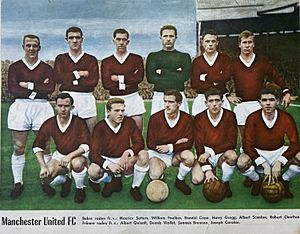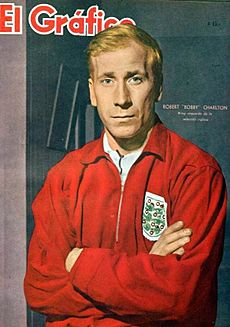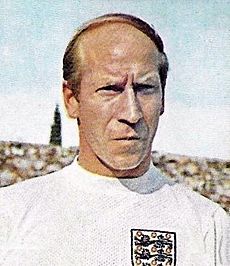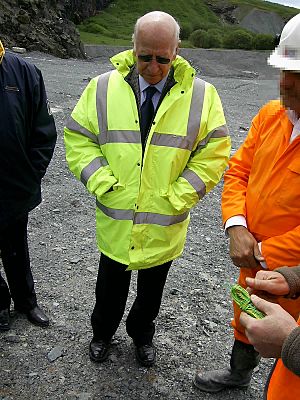Bobby Charlton facts for kids
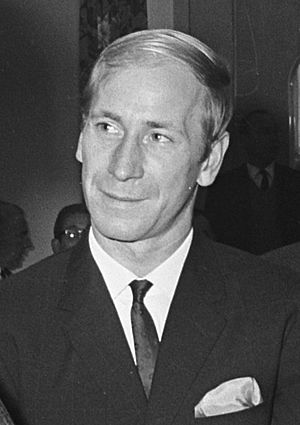
Charlton in 1966
|
|||||||||||||||||||
| Personal information | |||||||||||||||||||
|---|---|---|---|---|---|---|---|---|---|---|---|---|---|---|---|---|---|---|---|
| Full name | Robert Charlton | ||||||||||||||||||
| Date of birth | 11 October 1937 | ||||||||||||||||||
| Place of birth | Ashington, Northumberland, England | ||||||||||||||||||
| Date of death | 21 October 2023 (aged 86) | ||||||||||||||||||
| Place of death | Macclesfield, Cheshire, England | ||||||||||||||||||
| Height | 5 ft 8 in (1.73 m) | ||||||||||||||||||
| Position(s) | Midfielder, forward | ||||||||||||||||||
| Youth career | |||||||||||||||||||
| East Northumberland Schools | |||||||||||||||||||
| 1953–1956 | Manchester United | ||||||||||||||||||
| Senior career* | |||||||||||||||||||
| Years | Team | Apps | (Gls) | ||||||||||||||||
| 1956–1973 | Manchester United | 606 | (199) | ||||||||||||||||
| 1974–1975 | Preston North End | 38 | (8) | ||||||||||||||||
| 1976 | Waterford | 3 | (1) | ||||||||||||||||
| 1978 | Newcastle KB United | 1 | (0) | ||||||||||||||||
| 1980 | Perth Azzurri | 3 | (2) | ||||||||||||||||
| 1980 | Blacktown City | 1 | (1) | ||||||||||||||||
| Total | 652 | (211) | |||||||||||||||||
| International career | |||||||||||||||||||
| 1953 | England Schoolboys | 4 | (5) | ||||||||||||||||
| 1954 | England Youth | 1 | (1) | ||||||||||||||||
| 1958–1960 | England U23 | 6 | (5) | ||||||||||||||||
| 1958–1970 | England | 106 | (49) | ||||||||||||||||
| Managerial career | |||||||||||||||||||
| 1973–1975 | Preston North End | ||||||||||||||||||
| 1983 | Wigan Athletic (caretaker) | ||||||||||||||||||
|
Medal record
|
|||||||||||||||||||
| *Club domestic league appearances and goals | |||||||||||||||||||
Sir Bobby Charlton was an amazing English footballer who played as a midfielder or centre-forward. Many people think he was one of the best players ever! He was a key part of the England team that won the 1966 FIFA World Cup, and in that same year, he won the Ballon d'Or, which is a huge award for the best player in Europe.
Bobby Charlton spent almost his entire club career at Manchester United. He was known for his powerful shots from far away, his great passing, and his incredible energy. He was also very fair, only getting a warning from the referee twice in his whole career! He is one of only nine players in the world to have won the World Cup, the European Cup, and the Ballon d'Or. His older brother, Jack Charlton, was also a famous footballer and was on the same World Cup-winning team.
Bobby Charlton was born in Ashington, England, in 1937. He joined Manchester United when he was 15 and made his first-team debut in 1956. He quickly became a regular player and helped United win the league in 1957. He was also a survivor of the terrible Munich air disaster in 1958, which was a plane crash that killed many of his teammates. After this tragedy, he helped rebuild the team. He led Manchester United to win the FA Cup in 1963 and the league again in 1965 and 1967. In 1968, he captained the team to win the European Cup, scoring two goals in the final. This made Manchester United the first English club to win this important European trophy.
He left Manchester United in 1973 and later became a director at the club in 1984. For England, he played in four World Cups (1958, 1962, 1966, and 1970). When he retired from international football in 1970, he had played 106 games for England, which was a record at the time. He also held the record for most goals scored for both Manchester United and England for many years.
Contents
Early Life and Football Dreams
Bobby Charlton was born on October 11, 1937, in a town called Ashington in England. His dad was a coal miner. Bobby came from a family of footballers; many of his uncles and even his mother's cousin, Jackie Milburn, were professional players. However, Bobby always said that his grandfather and his mother, Cissie, were the most important people in helping him become a great player. His older brother, Jack, also became a professional footballer.
Club Career Highlights
Joining Manchester United
When Bobby was just 15, a scout from Manchester United saw him playing for his school team. He signed up as an amateur player in 1953 and later became a professional in 1954. At first, his mum wasn't sure about him having a football career, so he also started learning to be an electrical engineer.
Bobby became one of the famous "Busby Babes," which was the name given to the talented young players who came through Manchester United's youth system under their manager, Matt Busby. Bobby quickly moved up through the youth and reserve teams, scoring lots of goals. He made his first-team debut in October 1956, scoring two goals in his very first game!
Surviving the Munich Air Disaster
In February 1958, something very sad and tragic happened. The Manchester United team was flying back from a European Cup game in Yugoslavia when their plane crashed in Munich, Germany, after refueling.
The weather was very bad with heavy snow. The plane tried to take off twice but couldn't. On the third try, it crashed. Bobby Charlton was thrown out of his seat but survived. Seven of his teammates died right away, and another, Duncan Edwards, died a few weeks later. In total, 23 people lost their lives in the crash. Bobby was in the hospital for a week with head injuries and shock.
This was a very difficult time for Manchester United. Bobby Charlton, along with other survivors like Harry Gregg and Bill Foulkes, helped the club to rebuild. He was only 20 years old, but he was expected to help bring the team back to its former glory. He was the last living survivor of the crash until his own death in 2023.
Rebuilding and Winning Trophies
Bobby Charlton returned to playing football just a few weeks after the crash. Even though the team was still recovering, they managed to reach the FA Cup final in 1958, but they lost.
However, Manchester United's hard work paid off. In 1963, Bobby finally won the FA Cup, beating Leicester City 3-1. The team continued to get stronger, winning the league championship in 1965 and 1967. Bobby was recognized as one of the best players, winning the Football Writers' Association Footballer of the Year and the European Footballer of the Year (Ballon d'Or) in 1966.
European Cup Glory
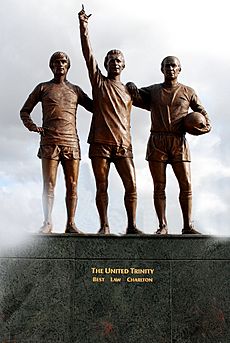
Ten years after the Munich disaster, Manchester United reached the 1968 European Cup Final. It was a very emotional night at Wembley Stadium. Bobby Charlton, as captain, scored two goals in a 4-1 win against Benfica after extra time. He lifted the trophy, making United the first English club to win the European Cup. This was a huge moment for the club and a tribute to those who died in Munich.
Leaving Manchester United
By the early 1970s, Manchester United was not as strong as before. Bobby Charlton played his last game for the club in April 1973. He had scored 249 goals and played a record 758 games for United. This appearance record was only broken by Ryan Giggs in 2008. His goalscoring record was later broken by Wayne Rooney in 2017.
International Career with England
England Debut and Early Success
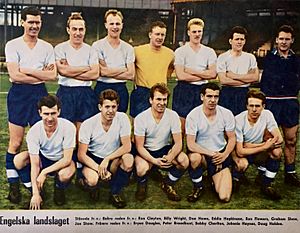
Bobby Charlton was called up to play for the England squad in April 1958, just over two months after the Munich air disaster. He made his debut against Scotland, scoring a fantastic goal in a 4-0 win. He quickly became a key player for England, scoring many goals.
1966 FIFA World Cup Victory
Bobby Charlton was a central figure in England's team for the 1966 FIFA World Cup, which was held in England. He scored important goals in the group stage and then two crucial goals in the semi-final against Portugal, helping England reach the final.
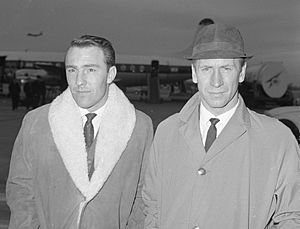
In the final against West Germany, England won 4-2 after extra time. It was a historic victory, and Bobby Charlton was a World Cup winner!
Later International Career and Records
After the World Cup, Bobby continued to play for England. He broke Jimmy Greaves' record for most goals scored for England in 1968. He played his 100th game for England in 1970, becoming captain for that match and scoring his 48th goal. His 49th and final goal came a month later.
He was part of the England squad for the 1970 FIFA World Cup in Mexico, making him the only England player to be in four World Cup squads. England reached the quarter-finals, where they lost to West Germany. After this tournament, Bobby Charlton decided to retire from international football at the age of 32, with a record of 106 caps (appearances) and 49 goals. His caps record was later broken by Bobby Moore in 1973, and his goalscoring record was broken by Wayne Rooney in 2015.
Life After Playing Football
Management and Directorships
After retiring as a player, Bobby Charlton became the manager of Preston North End in 1973. He also played a few games for clubs in Australia. Later, he became a director at Wigan Athletic and then joined the board of directors at Manchester United in 1984. He stayed involved with Manchester United for many years.
Charity Work and Recognition
Bobby Charlton was also involved in many charity activities. After visiting countries like Bosnia and Cambodia, he became very passionate about clearing landmines. He supported the Mines Advisory Group and even started his own charity called "Find a Better Way," which helps fund research to make landmine clearance safer for people.
He received many awards and honours for his amazing career and contributions. He was made an OBE in 1969 and a Knight in 1994, meaning he became "Sir Bobby Charlton." He was also inducted into the English Football Hall of Fame in 2002. In 2009, he was given the freedom of the city of Manchester, which is a special honour.
In 2016, Manchester United renamed the South Stand at their stadium, Old Trafford, in his honour, calling it the "Sir Bobby Charlton Stand."
Later Life and Passing
In November 2020, it was announced that Sir Bobby Charlton had been diagnosed with dementia, and he stepped away from public life.
Sir Bobby Charlton passed away on October 21, 2023, at the age of 86. His death was due to complications from a fall and dementia. His passing meant that Sir Geoff Hurst became the last surviving English player from the 1966 World Cup final team.
Manchester United and football fans around the world paid tribute to him. At their next match, United players wore black armbands, and a minute of silence was held. Flowers and scarves were laid by fans at the "United Trinity" statue outside Old Trafford, which features Bobby Charlton alongside Denis Law and George Best. His funeral was held in Manchester, with many famous football figures and Prince William attending to pay their respects.
Career statistics
Club
| Club | Season | League | National cup | League cup | Continental | Other | Total | |||||||
|---|---|---|---|---|---|---|---|---|---|---|---|---|---|---|
| Division | Apps | Goals | Apps | Goals | Apps | Goals | Apps | Goals | Apps | Goals | Apps | Goals | ||
| Manchester United | 1956–57 | First Division | 14 | 10 | 2 | 1 | — | 1 | 1 | 0 | 0 | 17 | 12 | |
| 1957–58 | First Division | 21 | 8 | 7 | 5 | — | 2 | 3 | 0 | 0 | 30 | 16 | ||
| 1958–59 | First Division | 38 | 29 | 1 | 0 | — | — | — | 39 | 29 | ||||
| 1959–60 | First Division | 37 | 18 | 3 | 3 | — | — | — | 40 | 21 | ||||
| 1960–61 | First Division | 39 | 21 | 3 | 0 | 0 | 0 | — | — | 42 | 21 | |||
| 1961–62 | First Division | 37 | 8 | 6 | 2 | — | — | — | 43 | 10 | ||||
| 1962–63 | First Division | 28 | 7 | 6 | 2 | — | — | — | 34 | 9 | ||||
| 1963–64 | First Division | 40 | 9 | 7 | 2 | — | 6 | 4 | 1 | 0 | 54 | 15 | ||
| 1964–65 | First Division | 41 | 10 | 7 | 0 | — | 11 | 8 | — | 59 | 18 | |||
| 1965–66 | First Division | 38 | 16 | 7 | 0 | — | 8 | 2 | 1 | 0 | 54 | 18 | ||
| 1966–67 | First Division | 42 | 12 | 2 | 0 | 0 | 0 | — | — | 44 | 12 | |||
| 1967–68 | First Division | 41 | 15 | 2 | 1 | — | 9 | 2 | 1 | 2 | 53 | 20 | ||
| 1968–69 | First Division | 32 | 5 | 6 | 0 | — | 8 | 2 | 2 | 0 | 48 | 7 | ||
| 1969–70 | First Division | 40 | 12 | 9 | 1 | 8 | 1 | — | — | 57 | 14 | |||
| 1970–71 | First Division | 42 | 5 | 2 | 0 | 6 | 3 | — | — | 50 | 8 | |||
| 1971–72 | First Division | 40 | 8 | 7 | 2 | 6 | 2 | — | — | 53 | 12 | |||
| 1972–73 | First Division | 36 | 6 | 1 | 0 | 4 | 1 | — | — | 41 | 7 | |||
| Total | 606 | 199 | 78 | 19 | 24 | 7 | 45 | 22 | 5 | 2 | 758 | 249 | ||
| Preston North End | 1974–75 | Third Division | 38 | 8 | 4 | 1 | 3 | 1 | — | — | 45 | 10 | ||
| Waterford United | 1975–76 | League of Ireland | 3 | 1 | 1 | 0 | 0 | 0 | — | — | 4 | 1 | ||
| Newcastle KB United | 1978 | National Soccer League | 1 | 0 | 0 | 0 | 0 | 0 | — | — | 1 | 0 | ||
| Perth Azzurri | 1979 | West Australian Football League | 3 | 2 | 0 | 0 | 0 | 0 | — | — | 3 | 2 | ||
| Blacktown City | 1980 | National Soccer League | 1 | 1 | 0 | 0 | 0 | 0 | — | — | 1 | 1 | ||
| Career total | 652 | 211 | 83 | 20 | 27 | 8 | 45 | 22 | 5 | 2 | 812 | 263 | ||
International
| National team | Year | Apps | Goals |
|---|---|---|---|
| England | 1958 | 6 | 7 |
| 1959 | 7 | 5 | |
| 1960 | 8 | 6 | |
| 1961 | 9 | 6 | |
| 1962 | 8 | 1 | |
| 1963 | 10 | 6 | |
| 1964 | 8 | 2 | |
| 1965 | 5 | 2 | |
| 1966 | 15 | 6 | |
| 1967 | 4 | 2 | |
| 1968 | 8 | 3 | |
| 1969 | 9 | 1 | |
| 1970 | 9 | 2 | |
| Total | 106 | 49 | |
Honours
Manchester United Youth
- FA Youth Cup: 1953–54, 1954–55, 1955–56
Manchester United
- Football League First Division: 1956–57, 1964–65, 1966–67
- FA Cup: 1962–63; runner-up 1956–57, 1957–58
- FA Charity Shield: 1965, 1967
- European Cup: 1967–68
England
- FIFA World Cup: 1966
- UEFA European Championship third place: 1968
- British Home Championship (outright): 1961, 1965, 1966, 1968, 1969
- (shared) 1958, 1959, 1960, 1964, 1970
Individual
- FWA Footballer of the Year: 1965–66
- FIFA World Cup Golden Ball: 1966
- FIFA World Cup All-Star Team: 1966, 1970
- Ballon d'Or: 1966; runner-up: 1967, 1968
- PFA Merit Award: 1974
- FWA Tribute Award: 1989
- FIFA World Cup All-Time Team: 1994
- Football League 100 Legends: 1998
- English Football Hall of Fame: 2002
- FIFA 100: 2004
- UEFA Golden Jubilee Poll: 14th
- PFA England League Team of the Century (1907 to 2007):
- Team of the Century 1907–1976
- Overall Team of the Century
- BBC Sports Personality of the Year Lifetime Achievement Award: 2008
- UEFA President's Award: 2008
- Laureus Lifetime Achievement Award: 2012
- FIFA Player of the Century:
- FIFA internet vote: 16th
- IFFHS vote: 10th
- World Soccer The Greatest Players of the 20th century: 12th
- IFFHS Legends
Orders and special awards
- Officer of the Most Excellent Order of the British Empire (OBE): 1969
- Commander of the Most Excellent Order of the British Empire (CBE): 1974
- Knight Bachelor: 1994
- Order of the Rising Sun, 4th class: 2012
See also
 In Spanish: Bobby Charlton para niños
In Spanish: Bobby Charlton para niños
- List of men's footballers with 100 or more international caps


